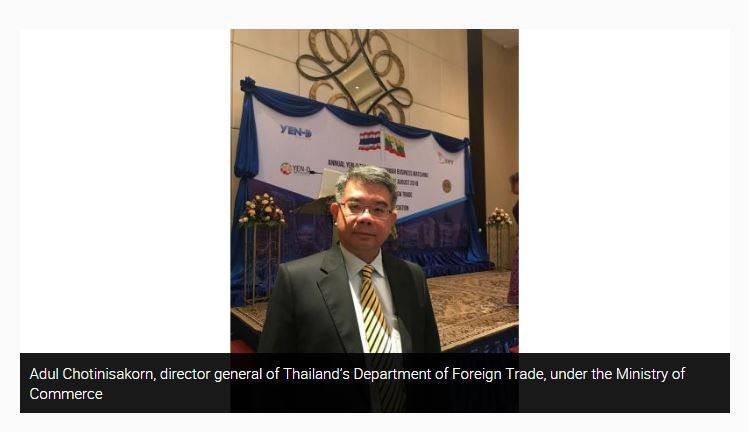Myanmar opening its doors wider
REVISED investment laws in Myanmar have been welcomed as offering greater opportunities for Thai companies of all sizes to move into wholesale and retail businesses across the border.
Pakainay Leng-ee, minister counsellor at the Thai embassy’s office of commercial affairs in Yangon, yesterday said Thai companies could have ownership in wholesale and retail businesses of up to 100 per cent in Myanmar or create joint ventures with local partners.
The latest update to Myanmar’s company law came into effect on August 1, making it much easier for foreign investors to do business there.
Yuwadee Thean-ngarm, director of legal consultancy Tilleke & Gibbins Myanmar Ltd, said that under the new law foreign investors can own up to 100 per cent of a wholesaling enterprise if they invest at least US$5 million. If they choose to have business partners, they can hold at least 20 per cent of an enterprise in shares by making a minimum initial investment of US$2 million.
For retail businesses, the minimum investment is US$3 million. But if local partners hold at least 20 per cent of the enterprise the minimum requirement is US$700,000, Yuwadee said.
The previous legal framework had been blamed for the constraints seen in foreign investment in recent years after Myanmar opened up the economy in 2011. Many other laws and regulations are under review.
Yuwadee said many large Thai firms are making feasibility studies about doing wholesale and retail businesses in Yangon.
Small and medium-sized (SMEs) can also share in the greater opportunities now open to them by seeking local partners for export and import activities, she said at a business matching event hosted by Thailand’s Department of Foreign Trade, under the Ministry of Commerce.
Department director general Adul Chotinisakorn, who led 70 young entrepreneurs to seek business matching opportunities with Myanmar companies, said he expected new businesses deals worth at least Bt200 million this year. Last year, business matching resulted in deals worth Bt200 million.
Myanmar, with its gross domestic product growing at 7-8 per cent a year, offers greater opportunities for Thai SMEs, he said. Thai products are welcomed in Myanmar as consumers view them as better than the Chinese equivalents.
However, Adul acknowledged that constraints remain, including the high rents in Myanmar.
He said that the department had, over the past four years, been building networks between young Thai and Myanmar entrepreneurs and also with those in Laos, Cambodia, Vietnam and Malaysia.
He said Myanmar is a young society compared to Thailand with its ageing population. This will lead to growing consumption and large pool of labour. Thirachot Chatthaweesak, director of Phattarachat Enterprise Company, which owns the Crocodite clothing brand, said he was looking for raw materials such as yarn and buttons.
For textile raw materials, Thailand has become more expensive for sourcing compared with Myanmar. “If we can find high-quality materials meeting our benchmarks, we will do business with local partners,” Thirachot said.
He said most of the company’s product range is sold in Thailand, with exports making up only about only 10 per cent.
Nattawin Phongsphetrarat, vice president of the Thai Business Association of Myanmar, said that while businesses may have been feeling the effects of an economic slowdown over the past two years, the economic potential remains and the revised investment laws are expected to faster facilitate new investment and boost the economy.
The business-matching event in Yangon yesterday resulted in Myanmar businesses placing purchase orders for Thai goods worth about Bt290 million, Thailand’s Department of Foreign Trade said.
Source: http://www.nationmultimedia.com/detail/Economy/30352655


 English
English




